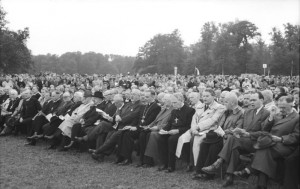Contemporary Church History Quarterly
Volume 19, Number 2 (June 2013)
Article Note: Benjamin Pearson, “The Pluralization of Protestant Politics: Public Responsibility, Rearmament, and Division at the 1950s Kirchentage” Central European History 43 (2010), 270-300.
By Matthew D. Hockenos, Skidmore College

Kirchentag 1954 in Leipzig. Source: Bundesarchiv, Bild 183-25414-0111 / CC-BY-SA
After WWII and twelve years of Nazi rule Catholic and Protestant church leaders in Germany agreed that at the center of Germany’s reconstruction needed to be a renewal of Christian values. They urged church members to take active, personal responsibility for political life. This was an especially strong sentiment among members of the former Confessing Church. The churches participated in the establishment of the Christian Democratic Union so that Christian values could have a more influential role in the political sphere and Reinhold von Thadden-Trieglaff founded the Kirchentag in 1949 to strengthen the faith and public responsibility of Protestant laity. Although Catholics and Protestants co-existed in the CDU it was in the late 1940s and early 1950s an uncomfortable co-existence because they differed on several issues, such as division, rearmament, and confessional schools. Adenauer’s policies challenged Christian unity. He won over Catholics and many conservative Protestants but lost the Protestant Left associated with Karl Barth, Gustav Heinemann, and Martin Niemöller. Pearson traces the manifestations of this split in the political debates that took place in the 1950s Kirchentage. The debates in the early 1950s were so caustic that “rather than promoting public responsibility and Christian unity for the transformation of German society, the churches were instead tearing themselves apart.” Eventually, however, the split among Protestants, he argues, forced the Protestant Church “to accept-even embrace-the liberal democratic value of political pluralism.” Protestants from both sides came to see political disagreement and debate as a positive sign of a working democracy.
